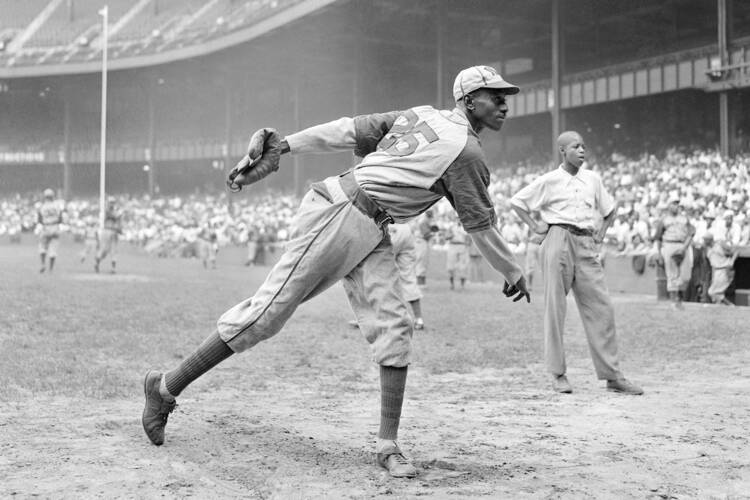Tradition and change are often in tension in the world of baseball; just consider the up-in-arms resistance the pitch clock met with when it was unveiled last season. Baseball is also highly scrupulous in regard to categorizing its past. Numerous operations exist solely for the purpose of recording nearly every statistic imaginable from as far back into baseball history as possible.
One recent change by Major League Baseball, long overdue, is using statistics to tell the full story of the sport: The league is finally incorporating stats recorded by Negro leagues players as part of M.L.B.’s official record books.
Negro leagues began to take off in 1920, when seven Black-only baseball organizations came to comprise what is commonly referred to as the “Negro Major Leagues.” The longest enduring of the bunch was the Negro American League, which included teams such as the Philadelphia Stars and the Kansas City Monarchs—the latter being the alma mater of Jackie Robinson before he broke professional baseball’s color barrier in 1947.
While even the most casual baseball fans know Jackie Robinson, this decision gives much-deserved exposure to some of the greatest baseball players you may have never heard of before. So move over, Ty Cobb. Josh Gibson is now baseball’s all-time leader in career batting average. Negro leagues pitching legend Satchel Paige now has the third-lowest recorded earned run average for a single season.
Some of baseball’s greatest talents are getting the much-belated recognition they deserve as the organization finally rights a historical wrong. But some have expressed reservations about the timing and intentions.
Carmen Nanko-Fernández, director of the Hispanic Theology and Ministry Program at the Catholic Theological Union and an avid baseball historian, points out that M.L.B. actually had a chance to atone for neglecting the accomplishments of Negro league players a long time ago. But it did nothing.
“They had their chance in 1969, well into the civil rights movement, and by that point, baseball had been officially integrated for 10 years,” she said.
In 1969, 10 years after the Boston Red Sox became the last team to have a Black player on their roster, the league’s Special Baseball Records Committee gave the distinction of “Major League” to other historical, now-defunct baseball leagues, including the Players’ League and Federal League. Yet those other leagues are almost unanimously considered to have been less competitive and talented than the Negro leagues.
Even with the signing of the Civil Rights Act fresh in the rearview mirror, M.L.B. still declined to give the Negro leagues their due.
So why would baseball choose now as a time to reckon with its exclusionary past? Yes, grappling with racial justice has been a prominent theme in our collective consciousness ever since the rise of the Black Lives Matter movement, but why in 2024? Ms. Nanko-Fernández points out that, like many things, money could be behind it.
On June 20, one day after Juneteenth, M.L.B. will be hosting a game between the St. Louis Cardinals and the San Francisco Giants at Rickwood Field, the former home of the American Negro League’s Birmingham Black Barons. The announcement that such a game would happen came last August, a timing that seems to play well into the recent decision to incorporate the statistics recorded in the Negro leagues.
Ms. Nanko-Fernández calls this aspect of the action “part of a really clever marketing campaign” by M.L.B., as demand for tickets to the game has been intense, with some seats reselling for as much as $8,000.
James Fisher, a professor emeritus of theology and American studies at Fordham University, also observed how this could very well be a carefully thought out financial and audience engagement strategy by Major League Baseball.
“Baseball is still a very conservative American institution, which is why a lot of people have been saying M.L.B. has been losing their market share of younger people, in particular to other sports like football,” Mr. Fisher said.
The numbers support this claim: the N.F.L. made $7 billion more than M.L.B. did in 2023, and the average age of N.F.L. viewership was found to be seven years younger than the M.L.B.’s in a 2016 study.
Although there could be an air of cynicism around the optics of M.L.B.’s decision, the bottom line is that this action needed to happen—and we should be glad it finally has.
“I must admit, I find myself with an overall upbeat view of the choice,” Mr. Fisher said. “Of course we can still ask ‘Why did this take so long?’, but it’s better late than never, and maybe baseball can bring in generations of new fans.”
Ms. Nanko-Fernández, while still asking questions of M.L.B., also said that “A lot of times when institutions do things like this, they're doing it in the sense of asking, ‘How does this make me look good at this moment and what can I get out of it?’ But I’m just so happy to see the underrepresented, the marginalized and those previously totally ignored get their recognition.”
It’s fair to be dubious when multibillion dollar corporations begin to speak of rectifications and efforts for inclusion, but ultimately, M.L.B.’s recent decision helps to shine a light on names that have been sitting in the shadows of history for far too long. America’s pastime can finally say its record books belong to those who deserve to be a part of them.








